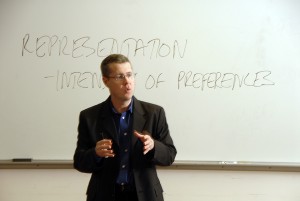
Political science professor Andrew Taylor leads a discussion about Congress during a class in Caldwell Hall.
Political science is the analytical study of governments, political processes, and public policy. A political science degree is an excellent option for students interested in public and nonprofit sector careers, law, private sector, NGOs, and international organizations. Majors in political science benefit from the proximity of the NCSU campus to the state General Assembly, executive offices, government agencies, party headquarters, political consulting firms, political and public policy think tanks, and advocacy organizations.
Students interested in science, technology, engineering or mathematics may pursue the B.S. option. Students pursuing the B.A. degree can add a concentration in one of four subfields:
American Politics Concentration: American politics courses relate to the study of citizenship and representation, public opinion and political behavior, group dynamics, campaigns and pluralism, and political institutions and the policy process in the United States. The concentration develops skills that benefit students interested in graduate and professional education, law school, careers in political or administrative positions, and business careers that emphasize governmental relations.
International Politics Concentration: This option encompasses courses related to the study of global issues, national security, international political economy, international law, United States foreign policy, and comparative political systems. The concentration develops skills that benefit students interested in graduate or professional education, careers in government service, international organizations, non-governmental organizations, issue advocacy, and corporations with international operations.
Law & Justice Concentration: Study the interplay of law and politics in the United States, in the international community and in countries around the globe; study the judicial process, the role of lawyers and judges; understand constitutional law, international law and comparative systems of law and justice; analyze the legal and theoretical dimensions of political life. This concentration develops skills that benefits students interested in graduate education, law school and careers in law enforcement, justice administration, and various justice system agencies.
Public Policy Concentration: The coursework in this concentration examines values, institutions, and processes in the formulation, implementation and evaluation of public policy at international, national, state and local levels. Multi-disciplinary approaches and various techniques of policy analysis are employed.
Graduates pursue careers in law, journalism, business, public and international affairs, government (federal, state and local), education, nonprofit agencies, campaign management, political consulting, interest group advocacy, and communications strategy.
Graduates pursue careers in law, journalism, business, public and international affairs, government (federal, state and local), education, nonprofit agencies, campaign management, political consulting, interest group advocacy, and communications strategy.
Courses include:
American Politics and Government, State and Local Government, Problems of American Democracy, Law and Justice, International Relations, Issues in Global Politics, The Presidency and Congress, Campaigns and Elections in the US Political System, Race in U.S. Politics, and The Justice System in the American Political Process
| College | |
| Discipline |
|
| Academic Department | |
| Departmental Contact | |
| Major Overview | |
| Plan Requirements | |
| Semester Sequence | |
| Related Majors | |
| Minors | |
| Skills You Could Develop |
|
| Learn More About This Major | |
| Career Titles | |
| Learn More About Careers |